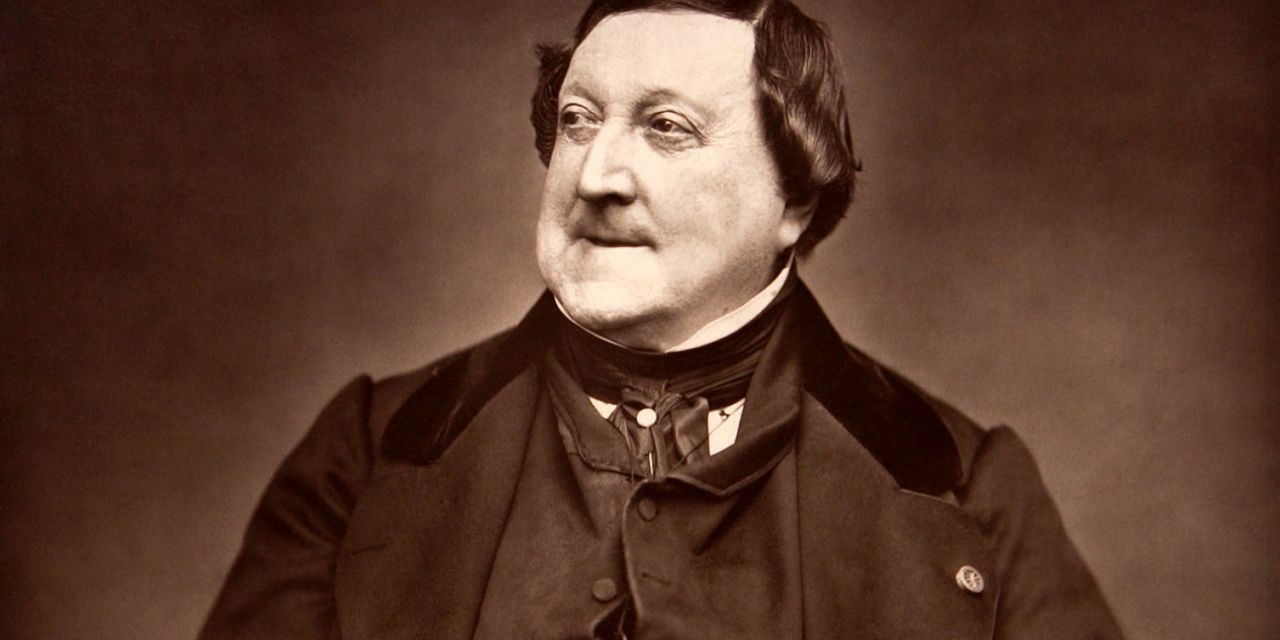Name: Gioachino Antonio Rossini
Born: 29 February 1792
Died: 13 November 1868
Place of birth: Pesaro, Italy
Known for: Italian composer famed for his 39 operas, particularly his comic works
Career
Rossini was arguably the successor to Mozart’s crown. He was born just a few months after the Austrian composer’s death, and was heavily influenced by his work. He was even nicknamed ‘the Little German’ while studying in Bologna.
Like Mozart, Rossini was something of a child prodigy. In 1804, when he was just 12, he composed a set of six string sonatas and at 14 he composed his first opera, Demetrio e Polibio. His first opera to be publicly staged was La cambiale di matrimonio (The Marriage Contract, 1810), which he composed when he was 18.
For a short time Rossini was incredibly prolific. He wrote 39 operas in just 19 years. The bulk of these – 30 in total – were composed between 1812 and 1822, starting with L’inganno felice (The Fortunate Deception) and La scala di seta (The Silken Ladder), both one-act comedies. Rossini’s first serious opera, Tancredi, based on Voltaire’s 1760 play Tancrède, came the following year.
This amazing run also included the hugely popular Il barbiere di Siviglia (The Barber of Seville) in 1816 and La cenerentola (Cinderella) in 1817. Unusually the heroines for both operas are sung by contraltos.
While he was particularly known for – and very successful with – comic operas, Rossini also composed serious works. Otello, a setting of Shakespeare’s play Othello, was written in 1816, while Semiramide was composed in 1823. It is based on another Voltaire tragedy, Sémiramis (1746).
Rossini’s final opera was also one of his most famous: Guillaume Tell (William Tell) was composed in 1829. It features the famous overture familiar as the theme music to the Lone Ranger TV show of the 1950s. Soon after the opera’s premiere at the Salle Le Peletier on 3 August 1829, Rossini hung up his opera-writing pen. He was only 38 at the time and never fully explained his retirement from opera.
He didn’t only compose opera. He also has oratorios, cantatas, chamber music and piano pieces to his name. In his later years he wrote Péchés de vieillesse (Sins of Old Age), a collection of 150 vocal, chamber and solo piano pieces, ranging from 1857 to shortly before his death in 1868. His last major work was 1863’s Petite messe solennelle (Little Solemn Mass).
Rossini transformed Italian opera, setting new standards for both comic and serious works. He introduced embellishments to his opera buffa, requiring much of his singers. His music was lyrical, with strong characterisation, extensive multi-character ensembles, and dramatic use of the chorus.
He had a profound influence on composers such as Verdi, Meyerbeer, Offenbach and even Wagner. Much of his output was wildly successful and he retired a wealthy man.
Personal life
An only child, Rossini was born to musical parents in the Italian town of Pesaro on 29 February 1792. His father Giuseppe earned his living as a meat inspector at an abattoir, but was also a trumpeter in a variety of bands and orchestras; his mother Anna nee Guidarini was a singer, as well as a seamstress. Though untrained, she was quite successful as a singer of comic operas and toured to theatres across Italy, often taking her young son with her.
Giuseppe was somewhat irresponsible, having been imprisoned at least twice, although he did teach his young son the horn. Much of the young Rossini’s upbringing was left to Anna, with help from Rossini’s grandmothers.
In 1802, the family moved to the northern Italian town of Lugo. Here, Rossini received a good basic education in Italian, Latin and arithmetic. He also studied music under Giuseppe Malerbe, a priest who introduced him to the music of Haydn and Mozart – something which was to have a profound effect on Rossini’s music.
When Anna was forced to give up her singing career, the family settled in Bologna. Aged 14, Rossini entered the Liceo Musicale, where he studied singing, cello, piano and composition. He was described as a lazy student, but was a quick learner. He wrote some substantial compositions while at the conservatoire.
The composer was something of a ladies’ man, known for his relationships with women singing in the companies he composed for. His lovers included Ester Mombelli, who sang soprano and mezzo-soprano, and contralto Maria Marcolini.
In 1822 he married Spanish soprano and composer Isabella Colbran. The couple separated 15 years later. Colbran died in 1845, and the following year Rossini married Olympe Pélissier, a 46-year-old French artists’ model and courtesan whom he had lived with since meeting her in Paris in 1830.
Rossini died at his villa in Passy, Paris, France, on 13 November 1868 at the age of 76, following a short illness, and an unsuccessful operation to treat colorectal cancer. After his death, some of his wealth was used to set up a conservatoire in Pesaro and a home for retired opera singers in Paris.
Initially buried in Pere Lachaise cemetery in Paris, his remains were moved to the church of Santa Croce, Florence, in 1887.
Did you know?
He was a lover of fine food and even has several dishes named after him. These include the decadent Tournedos Rossini, which consists of fillet mignon and foie gras fried in butter, topped with black truffle and demi-glace, cannelloni Rossini stuffed with truffles and foie gras.
Best-known works
While successful during his lifetime, Rossini’s work fell out of favour after his death and was rarely performed. However, his works were reintroduced in the 20th century and are often staged today. Two of his most well-known pieces are the aria ‘Largo al factotum’ from The Barber of Seville with its refrain of ‘Figaro! Figaro! Figaro!’, and that overture from William Tell.
Image
Italian composer Rossini was something of a gourmand, with some decadent dishes taking his name (Composer Rossini G 1865 by Carjat, via Wikimedia Commons).

